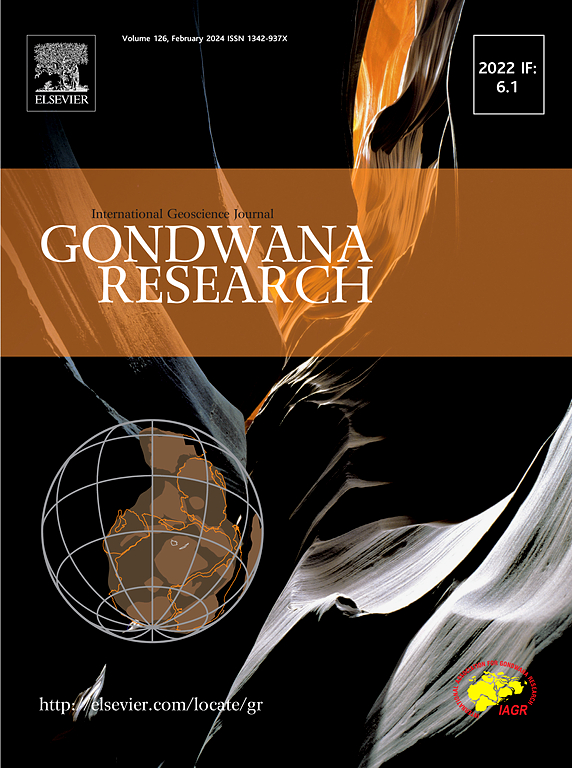能源转型、全球化与FDI: T-MEC国家实现可持续发展目标的途径
IF 7.2
1区 地球科学
Q1 GEOSCIENCES, MULTIDISCIPLINARY
引用次数: 0
摘要
对气候变化的日益关注强调了可持续发展做法的必要性,特别是在高度工业化地区。鉴于此,本研究探讨了可能在实现可持续发展目标的政策中发挥关键作用的区别因素。因此,研究了1990年至2022年能源转型、贸易全球化、能源强度和外国直接投资对T-MEC国家二氧化碳排放的影响。本研究采用了新颖的计量经济学方法,包括CS-ARDL和通过FMOLS和DOLS进行稳健性检验。采用Dumitrescu Hurlin(2012)面板因果关系检验来确定研究变量之间的因果关系。研究表明,从短期和长期来看,能源转型、贸易全球化和外国直接投资对二氧化碳排放的减少都有贡献。此外,因果关系检验证实了贸易全球化、能源强度与CO2排放之间存在双向关系,而CO2排放与能源转型之间存在单向因果关系。这些发现与可持续发展目标7:负担得起的清洁能源和可持续发展目标13:气候行动相一致。他们强调采用和消耗清洁能源和气候变化的重要性,政策制定者应该关注这些领域,通过经济发展确保环境的可持续性。本文章由计算机程序翻译,如有差异,请以英文原文为准。

Energy transition, globalization, and FDI: Pathways to achieve sustainable development goals in T-MEC countries
Growing concerns about climate change have emphasized the need for sustainable development practices, particularly in highly industrialized areas. Given that, this study explores the distinguishing factors that may play a vital role in policies to reach the SDGs. Therefore, examines the impact of the energy transition, trade globalization, energy intensity, and foreign direct investment on CO2 emissions in T-MEC countries from 1990 to 2022. The study applies novel econometric approaches, including CS-ARDL and robustness checks through FMOLS and DOLS. Also, Dumitrescu Hurlin (2012) Panel Causality test is adopted to identify causal associations among the study variables. The study shows that energy transition, trade globalization, and foreign direct investment contribute to the reduction of CO2 emissions in the short and long term. Moreover, the causality test confirms the bidirectional association between trade globalization, energy intensity, and CO2 emissions, while the unidirectional causality is found between CO2 emissions and energy transition. These findings are consistent with Sustainable Development Goal (SDG) 7: Affordable Clean Energy and SDG 13: Climate Action. They emphasize the importance of adopting and exhausting clean energy, and climate change, policymakers should focus on these areas to ensure environmental sustainability through economic development.
求助全文
通过发布文献求助,成功后即可免费获取论文全文。
去求助
来源期刊

Gondwana Research
地学-地球科学综合
CiteScore
12.90
自引率
6.60%
发文量
298
审稿时长
65 days
期刊介绍:
Gondwana Research (GR) is an International Journal aimed to promote high quality research publications on all topics related to solid Earth, particularly with reference to the origin and evolution of continents, continental assemblies and their resources. GR is an "all earth science" journal with no restrictions on geological time, terrane or theme and covers a wide spectrum of topics in geosciences such as geology, geomorphology, palaeontology, structure, petrology, geochemistry, stable isotopes, geochronology, economic geology, exploration geology, engineering geology, geophysics, and environmental geology among other themes, and provides an appropriate forum to integrate studies from different disciplines and different terrains. In addition to regular articles and thematic issues, the journal invites high profile state-of-the-art reviews on thrust area topics for its column, ''GR FOCUS''. Focus articles include short biographies and photographs of the authors. Short articles (within ten printed pages) for rapid publication reporting important discoveries or innovative models of global interest will be considered under the category ''GR LETTERS''.
 求助内容:
求助内容: 应助结果提醒方式:
应助结果提醒方式:


